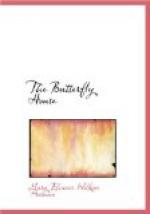both aunts were in the midst of their respective services,
and the cook, who was intensely religious, engaged
in preparing dinner, she and her old grandmother played
pinocle. However, although Annie played cards
very well, it was only with her relatives. She
had never been allowed to join the Fairbridge Card
Club. She never attended a play in the city, because
Aunt Jane considered plays wicked. It was in reality
doubtful if she would have been permitted to listen
to Lydia Greenway, had that person been available.
Annie’s sole large recreation was the Zenith
Club, and it meant, as she had said, much to her.
It was to the stifled young heart as a great wind
of stimulus which was for the strengthening of her
soul. Whatever the Zenith Club of Fairbridge was
to others, it was very much worth while for little
Annie Eustace. She wrote papers for it, which
were astonishing, although her hearers dimly appreciated
the fact, not because of dulness, but because little
Annie had written them, and it seemed incredible to
Fairbridge women that little Annie Eustace whom they
had always known, and whose grandmother and aunts
they knew, could possibly write anything remarkable.
It was only Alice Mendon who listened with a frown
of wonder, and intent eyes upon the reader. When
she came home upon one occasion, she remarked to her
aunt, Eliza Mendon, and her cousin, Lucy Mendon, that
she had been impressed by Annie Eustace’s paper,
but both women only stared and murmured assent.
The cousin was very much older than Alice, and both
she and her mother were of a placid, reflective type.
They got on very well with Alice, but sometimes she
had a queer weariness from always seeing herself and
her own ideas in them instead of their own. And
she was not in the least dictatorial. She would
have preferred open, antagonistic originality, but
she got a surfeit of clear, mirror-like peace.
She was quite sure that they would quote her opinion
of Annie Eustace’s paper, but that did not please
her. Later on she spoke to Annie herself about
it. “Haven’t you something else written
that you can show me?” She had even suggested
the possibility, the desirability, of Annie’s
taking up a literary career, but she had found the
girl very evasive, even secretive, and had never broached
the subject again.
As for Margaret Edes, she had never fairly listened
to anything which anybody except herself had written,
unless it had afforded matter for discussion, and
the display of her own brilliancy. Annie’s
productions were so modestly conclusive as to apparently
afford no standing ground for argument. In her
heart, Margaret regarded them as she regarded Annie’s
personality, with a contempt so indifferent that it
was hardly contempt.
She proceeded exactly as if Annie had not made such
a fervent disclaimer. “The Zenith Club
is the one and only thing which lifts Fairbridge,
and the women of Fairbridge, above the common herd,”
said she majestically.




